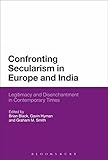Confronting secularism in Europe and India
Material type: TextPublication details: London Bloomsbury 2014Description: viii, 208p. 24 cmISBN:
TextPublication details: London Bloomsbury 2014Description: viii, 208p. 24 cmISBN: - 9781780935065 (hardback)
- 211.6094 23 CO-
- BL2765.E85 C66 2014
 Print
Print
| Item type | Home library | Collection | Call number | Status | Date due | Barcode | |
|---|---|---|---|---|---|---|---|
 Print
Print
|
OPJGU Sonepat- Campus Main Library | General Books | 211.6094 CO- (Browse shelf(Opens below)) | Available | 136062 |
Includes bibliographical references (pages 185-199) and index.
Machine generated contents note: -- Confronting Secularism in Europe and India: An Introduction (Brian Black, University of Lancaster, UK)Part I: Political Secularism1. Reframing Secularism: Religion, Nation and Minorities in India (Rochana Bajpai, Department of Politics and International Studies, School of Oriental and African Studies (SOAS), London, UK)2. Should Europe Learn from Indian Secularism? (Bhargava Rajeev, Centre for the Study of Developing Societies (CSDS), Delhi, India) Part II: Secularism and Religion3. Understanding Secularism by Means of Genealogy (Gavin Hyman, University of Lancaster, UK) 4. The Political Theology of Indian Christian Citizenship: An Instance of Secularism as Culture (Nandini Chatterjee, University of Exeter, UK)Part III: Secularism, Religion and Violence5. Secularism, Agonism and the Politics of Conviction (Mark Wenman, University of Nottingham, UK)6. Secularism, History and Violence in India (Deborah Sutton, University of Lancaster, UK)Part IV: Beyond Secularism?7. Confronting the Confrontation: Europe beyond Secularism? (Evert van der Zweerde, Radboud University, Nijmegen, Netherlands)8. Secularization beyond Western Eyes (Vincent Pecora, University of Utah, USA)BibliographyIndex.
"Can secularism continue to provide a foundation for political legitimacy? It is often claimed that one of the cultural achievements of the West has been its establishment of secular democracy, wherein religious belief is respected but confined to the sphere of private belief. In more recent times, however, political secularism has been increasingly called into question. Religious believers, in numerous traditions, have protested against the distortion and confinement that secularism imposes on their faith. Others have become uneasily aware of the way in which secularism no longer commands universal assent in the way it once did.Confronting Secularism in Europe and India adds to this debate by staging a creative encounter between European and Indian conceptions of secularism with a view to continuing new and distinctive trajectories of thought about the place and role of secularism in contemporary times. Looking at political secularism, the relationship between secularism and religion, and religious and secular violence, this book considers whether there are viable alternatives to secularism in Europe and in India"--
"Can secularism continue to provide a foundation for political legitimacy? It is often claimed that one of the cultural achievements of the West has been its establishment of secular democracy, wherein religious belief is respected but confined to the sphere of private belief. In more recent times, however, political secularism has been increasingly called into question. Religious believers, in numerous traditions, have protested against the distortion and confinement that secularism imposes on their faith. Others have become uneasily aware of the way in which secularism no longer commands universal assent in the way it once did. Confronting Secularism in Europe and India adds to this debate by staging a creative encounter between European and Indian conceptions of secularism with a view to continuing new and distinctive trajectories of thought about the place and role of secularism in contemporary times. Looking at political secularism, the relationship between secularism and religion, and religious and secular violence, this book considers whether there are viable alternatives to secularism in Europe and in India"--
There are no comments on this title.

